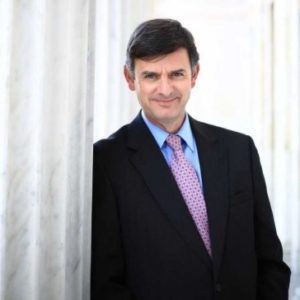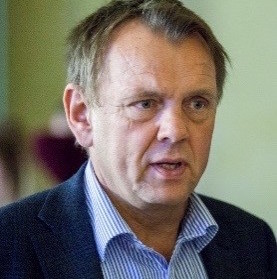Download Program Overview (PDF)
Download Full Program (PDF)
Program Highlights
Keynote presenters are Brian Kennedy (Director Peabody Essex Museum) who argues that art museums are essential places for learning visual literacy and is a driving force in transforming the museum landscape, philosopher Alva Noë (University of California, Berkeley), who puts forward the idea that perception is not so much a process in the brain, but a skilful activity of the body as a whole, and Ernst Wagner (Academy of Fine Arts Munich) who develops a model of visual literacy with a specific focus on art museums. The conference will be held in M – Museum of Leuven (Belgium), where the basic curatorial principle is based on visual literacy, applied through research as well as experiment.
Overview
Wednesday, 16th October 2019
4 – 5:30 PM: IVLA Board Meeting
5 PM – 7 PM: Registration and welcome drink
Thursday, 17th October 2019
9 AM – 10 AM: Keynote speaker: Brian Kennedy
10 AM – 5 PM: Parallel sessions
Thinking the visual
Visual experience visit of the museum
Applying the visual
Workshop on (visual) Emotion Design
4:10-4:50 PM: Keynote speaker: Ernst Wagner
6 – 9 PM: Conference dinner
Friday, 18th October 2019
9 AM – 10 AM: Keynote speaker: Alva Noë
10 AM – 5 PM Parallel sessions:
Measuring the visual
Workshop on eye movement research
Learning the visual
Workshop on visual prompts for creative writing
Saturday, 19th October 2019
8AM – 10AM IVLA Board Meeting
10 AM – 4 PM Guided visit of Brussels
The deadline for abstract submission for this conference is expired. A detailed program with the accepted abstracts will be available soon.
Detailed Program
Thursday October 17th
 Keynote speaker: Brian Kennedy
Keynote speaker: Brian Kennedy
Kennedy is an art museum director who has worked in Ireland and Australia, and now lives and works in the United States. He currently is the Director of the Peabody Essex Museum in Boston. He was the Director of the Toledo Museum of Art in Ohio from 2010 until 2019 and of the Hood Museum of Art from 2005 to 2010, and the National Gallery of Australia (Canberra) from 1997 to 2004. He advocates a paradigm change in curation towards visual literacy and ultimately the multisensorial. Kennedy is a driving force in transforming the museum landscape.
Parallel sessions: Thinking the Visual
Thinking about the visual is as old as the practice of producing images. In different fields, scholars continue to think about theoretical models of the visual. The session maps theoretical approaches from different disciplines and stimulates interesting cross-pollination.
Parallel sessions: Applying the Visual
The visual invades the private life of people through old and new media on a daily basis. Understanding the mechanisms behind this is crucial. This session includes contributions on visual strategies, techniques and methodologies that are used in advertising, the art market, social media studies and time-based media.
Workshop on (visual) Emotion Design by Studio Louter. Case study: The Gothic Saint Peter’s church in Leuven
How can you use mixed reality to create a meaningful, unforgettable and authentic visitor experience within a sacred site? How can you reveal the versatile stories of a church filled with Flemish masterpieces to a wider audience? In this talk M – Museum Leuven and Studio Louter explain how they applied the Emotion Design method to develop a meaningful and unique digital sensory visitor experience in the restored St Peter’s Church. Mixed Reality on a HoloLens allows to extend the physical space beyond its limitations and brings centuries-old artworks such as Dieric Bouts’ masterpiece The Last Supper closer than ever before.
 Keynote speaker: Ernst Wagner
Keynote speaker: Ernst Wagner
Ernst is a lecturer and senior-researcher at the Academy of Fine Arts in Munich and at the UNESCO-Chair in Arts Education in Erlangen. Educated as an artist at the Academy of Fine Arts in Munich and graduated with a PhD in art history at the University of Munich, he chaired the European Network for Visual Literacy (ENViL) in 2016 and 2017 and coordinated the development of the “Common European Framework for Visual Literacy”. He is a member of the European Regional Council of InSEA and honorary professor at the Hong Kong University of Education.
Friday October 18th
 Keynote speaker: Alva Noë
Keynote speaker: Alva Noë
Alva Noë is a writer and philosopher living in Berkeley and New York. He is the author of Action in Perception (MIT 2004), Out of Our Heads: Why You Are Not Your Brain and Other Lessons from the Biology of Consciousness (FSG 2009), Varieties of Presence (Harvard 2012), and Strange Tools: Art and Human Nature (FSG, 2015). His newest book is Infinite Baseball: Notes from a Philosopher at the Ballpark (OUP 2019). He is a Professor of Philosophy at the University of California, Berkeley, where he is also a member of the Center for New Media and the Institute for Cognitive and Brain Sciences. Noë is a 2012 recipient of a Guggenheim Fellowship and a 2018 recipient of the Judd Hume Prize in Advanced Visual Studies.
Parallel sessions: Measuring the Visual
The visual has a large impact on our thinking and behavior. Several disciplines try to map this influence trough data sets based on phenomena/topics such as color, digital imagery and spatial skills. This session comprises several methodologies such as eye tracking and psychometric analysis.
Parallel sessions: Learning the Visual
To enhance visual literacy competencies and stimulate critical thinking, specific visual (learning) experiences are created in specific contexts, such as classrooms, museum galleries, and other public spaces. This has created a myriad of good practices in very different settings. This session brings together scholars and practitioners from the field of education, museum studies and cultural heritage institutions. Together they will focus on the questions of ‘why’ and ‘how’ the visual should take a central role in education.
Workshop on eye movement research by Johan Wagemans
Johan Wagemans is a full professor at the Faculty of Psychology and Educational Sciences and head of the Experimental Psychology Unit (University of Leuven) and has decades of experience in psycho-aesthetics of visual arts.
Did you see it? This question is sometimes difficult to answer. As it happens, everybody sees things differently. This makes looking at art and the experience of art unique. There is no better place than a museum to research how people look at art and analyze the processes that are involved in the interpretation and appreciation of an image. M – Museum Leuven organized an experiment, in cooperation with the Laboratory for Experimental Psychology KU Leuven, which mapped the eye movement patterns of over 2000 visitors. During this workshop, Prof. Dr. Johan Wagemans provides insight into the biology of perception and the research possibilities of eye movement research and visual arts.
Workshop on visual prompts for creative writing.
Case study: Visual Verse Youth by Kristen Harrison
Kristen Harrison is a publisher and visual education advocate with 20 years of experience working in publishing in Australia, the UK and now Berlin, Germany.
In this hands-on creative writing workshop Harrison will demonstrate Visual Verse Youth, a creative writing model that uses visual prompts to inspire young people aged 11-17 to write and communicate. The model is based on visualverse.org, an online anthology of art and words. Each month, they curate an image and invite writers to respond with a piece of original writing.
Kristen will take the IVLA 2019 audience through a series of visual exercises designed to awaken visual imaginations, shed inhibitions about writing and communicating, prime students with a word bank of visual vocabulary, then hone in to create a finished piece of creative writing. Kristen will discuss how to adapt the program to suit specific student needs and show examples of Visual Verse Youth in action. The audience will leave with a set of practical ideas for using visual literacy as a literacy-learning tool in the classroom.

